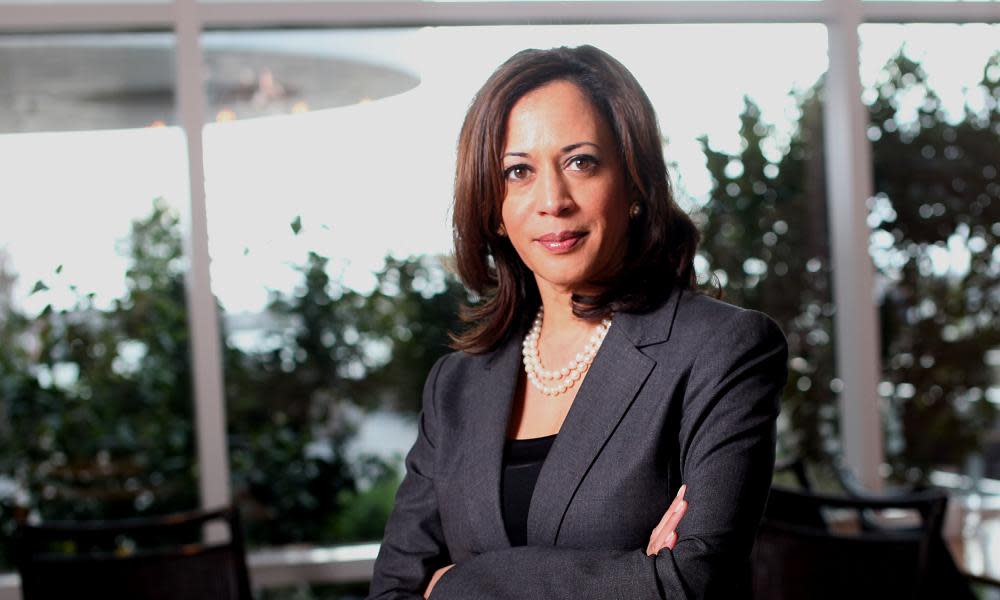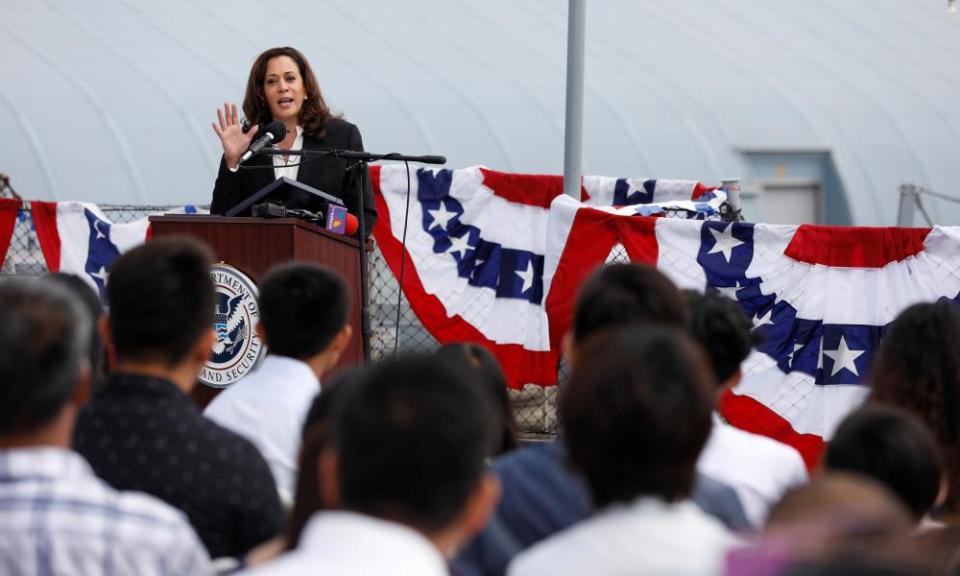Kamala Harris: young, black, female – and the Democrats’ best bet for 2020?

Kamala Harris, California’s new senator, earlier this month made a visit to Chowchilla state prison, often described as the largest women’s prison in the world. Harris, only the second black woman to have been elected to the senate, toured the facility and sat down to talk with inmates. She later called them “extraordinary”, and praised their optimism about finding a new life after prison.
But the moment she dwelled on most was a visit to the silk-screening room, where the women were manufacturing American flags.
Later, in front of an audience of criminal justice reform advocates in Washington DC, Harris would share that story. She gestured out the window to the American flags flying above the nation’s capital, some of which she suggested may have been made in Chowchilla. “Isn’t it part of who we are in America that we believe in second chances?” she asked.
Six months into the presidency of Donald Trump, Republicans are flailing amid efforts to erase health insurance for tens of millions of Americans. Democrats are already eagerly looking forward to the 2020 presidential race – and a new candidate to lead them.
However, the Democratic party is also riven with disagreement. Does its salvation lie in maintaining a centrist position, or taking a strong shift left, towards Bernie Sanders’s unapologetic embrace of universal healthcare, a higher minimum wage, and tuition-free colleges?
There is a growing presidential buzz surrounding Harris, who is making headlines after her tough questioning of attorney general Jeff Sessions during a Senate hearing, and then reportedly wowing big Democratic donors at an event in the Hamptons this month.
In an America where racism has been emboldened and where the white supremacist Ku Klux Klan recently held a rally in a college town and was confronted with more than a thousand furious protesters, the Democratic party is still negotiating its own racial politics. It is caught between those who are moving to woo back white working-class voters who defected to Trump, and those who argue that it would be better to focus on mobilising African American voters, whose turnout dropped in 2016.
There’s a long list of potential 2020 contenders, many of them, including Harris, making the obligatory claims that they are focused on their current jobs and not thinking ahead to the White House. Sanders, now 75, still has enthusiastic backers and has been touring the country, as has senator Elizabeth Warren, the progressive firebrand from Massachusetts. Warren has long been enough of a challenge to Trump that he gave her a demeaning nickname during his campaign: Pocahontas, a reference to her reported Native American descent.
Former vice-president Joe Biden, who chose not to run for president in 2016, has a new book out, Promise Me Dad, about the year after his son Beau’s death from cancer. He has been blunt in his frustration at what he sees as the failure to channel the economic anxieties of the middle class: “You didn’t hear a single solitary sentence in the last campaign about that guy working on the assembly line making 60,000 bucks a year and a wife making $32,000 as a hostess in a restaurant.”
Harris is a comparative unknown on the national stage – one recent poll found that 53% of voters had never heard of her. But she offers an interesting solution to the problem facing the party. She is a leader whose success inspires young women of colour. At the same time, Harris’s rhetoric and positions are often scrupulously centrist. She likes to talk about how her civil rights activist family were appalled when she decided to become a prosecutor. Rather than try to challenge America’s love of law-and-order politics, Harris is trying to reshape that instinct, pivoting from “tough on crime” to “smart on crime”, the title of her 2009 book.

At Women Unshackled, a criminal justice reform conference in Washington DC last week, Harris was treated like a star. The conference planned for 300 attendees but attracted double that and she was mobbed in the hallway by enthusiastic young women. Vogue magazine’s website ran a photo of the senator surrounded by jubilant young faces, with women crowding around her, arms outstretched to get a photograph on their phones. After her speech, Harris told a reporter for Yahoo news that Democrats needed to have a message “much bigger” than resisting Trump.
“The issues are not simple, so the message is not going to be simple,” she said, rejecting any “monosyllabic” slogan, “but essentially it’s about telling the American public we see them”.
Criminal justice reform, one of Harris’s key issues, is also one of the Democratic party’s failures. Hillary Clinton was attacked for her role in boosting the party’s harsh, pro-prison stance, part of a push towards mass incarceration that has devastated black families and that many Americans now see as a shameful mistake.
Young activists confronted Clinton over labelling young black Americans in 1996 as “the kinds of kids that are called ‘super-predators’, no conscience, no empathy. We can talk about why they ended up that way but first we have to bring them to heel.”
Harris is pursuing criminal justice legislation focused on practical problems: encouraging states to reform their bail systems, which trap low-income defendants in jail before their trials simply because of their inability to pay, and treating incarcerated women with more dignity, including providing them with free tampons and calls home to their children.
At the conference, Harris’s speech was relaxed and anecdotal, drawing on her time as a prosecutor and California attorney general. She also struck repeated notes that might appeal to a more conservative audience, noting: “I agree we must be talking about wasteful spending in our country … we must be talking about tax reform.”
Harris repeatedly emphasised her willingness to lock up violent offenders and based her appeals for reform on a mix of moral and financial arguments. She highlighted her much-criticised approach to reduce truancy among children in San Francisco by “being the bad guy” and deciding “to start prosecuting parents for truancy”.
“I’m going to tell you, half the city threw tomatoes at me,” she said.
She made no fierce indictments of America’s racism, no attempts to grapple with why the US criminal justice system is so broken. Instead, she has directed tough jabs at Sessions, the attorney general with a history of fierce opposition to criminal justice reform.
At one point, Harris referred to the attorney general as “this guy” and his policies as “crazy”, saying: “The war on drugs was an abject failure … with this guy talking about reviving the war on drugs, it’s crazy.”
Jamira Burley, a criminal justice reform advocate who worked on Clinton’s campaign efforts to turn out millennial voters, said the young activists she trains enthusiastically share clips of Harris on social media. They appreciate Harris asking tough questions, and say her presence in national office “allows women of colour to dream bigger”. But Burley herself has reservations.
“I would like her to talk more about the movement for black lives,” Burley said. “A lot of elected officials, especially elected officials of colour, tend to stay away from issues that are racial because they don’t want to be in a box. I would really appreciate it if she would take a more forceful approach.”
Harris’s approach to talking about criminal justice tends to be more focused on her experience as a prosecutor. Burley said she would like to hear more about “who she is as a person who grew up as a person of colour and was able to obtain the success that she obtained, recognising that’s not the case for most people of colour”.
Tracy Sefl, a longtime Democratic strategist and adviser to Clinton’s campaign, said she had donated to Harris and was a fan, as well as being impressed with the gravitas she had shown in her first months in office.
“I think the biggest challenge she has in front of her is to continue to do her senatorial duties and participate in that regard while still having this kind of buzz,” she said.
Sefl laughed at a recent conservative attack line, which compared Harris to America’s first black attorney general – a man loathed by Republicans – by calling her “Eric Holder in a skirt”.
Harris would be no stranger to that kind of sexism, Sefl said. “Anything that ends ‘in a skirt’ is usually coming from someone who’s opinion isn’t going to matter for me.”
HARRIS CV
Born 20 October 1964, in Oakland, California.
Family Her mother, who was born in India, was a breast cancer researcher, and her father, from Jamaica, was an economics professor at Stanford University.
Education Howard University in Washington, and University of California.
Career Started out as a deputy district attorney in Alameda county, California, before becoming district attorney of San Francisco, where she focused on crime prevention. She later became California’s attorney general and, in 2016, was voted a California senator. She gained attention for her tough questioning of US attorney general Jeff Sessions during a recent Senate hearing, and has been described as a potential candidate for president in 2020.

 Yahoo News
Yahoo News 
